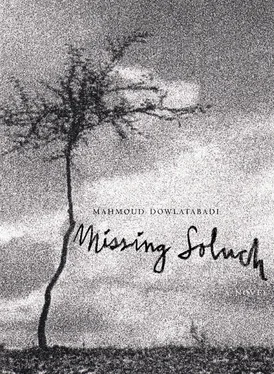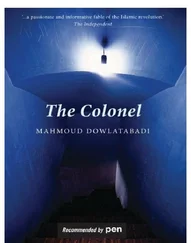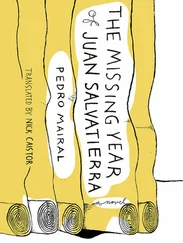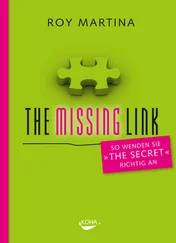Hajer went to help tie the chador around her brother’s waist. Abbas pulled on his canvas shoes, wrapped a piece of cloth around his ears, and took the snow shovel before leaving. Abrau was left with his mother and sister to help him prepare for going out into the snowy alleys. Mergan wrapped the chador around Abrau’s shoulders and his sides.
Abrau said, “The cloth satchel — cover my back with the satchel, Hajer!”
Hajer looked at her mother, who said, “Get it. Let’s use the satchel to cover his back and shoulders. It’s as if we were sending the warrior Ali Akbar to the arena!”
Abrau said, “What about my feet? You want me to go out in the snow with bare feet?”
“We’ll wrap up your feet. And stop needling me with your complaints!”
Abrau pulled the satchel over his back and tied it across his chest. Now Mergan was tying the ends of Abrau’s pant legs shut with a piece of rag. Then it was time for the feet themselves. Abrau sat at the edge of the wall, leaning against it with his legs outstretched. Mergan took one of his feet onto her knee and Hajer took the other, and both busied themselves with wrapping cloth and rags around them. They tied the last knot around the back of his feet, and then Mergan tossed his canvas shoes over to him. She said, “Okay, now get yourself up off the ground. It’s not as if you’re a pregnant woman.”
Abrau put his shoes on while still seated. He still had doubts about this all. Because of this, his hands took their time putting on the shoes. Mergan decided not to bother herself with him any longer. She went to the stove and called Hajer to her and both busied themselves with drinking their tea. Finally, Abrau rose — he had used up all of his delaying excuses now — and he took the shovel and walked out the door.
The snowfall was slowing. The sky was shaking out the last of the precipitation. The snow fell more and more lightly. Mergan took the tin tray in her hands. She told Hajer to take the container for carrying embers and to clean out the ashes and to come to help her. They both went outside. The first task was to clear a footpath. They began working. The snow was heavy, but Mergan had seen snow like this many times before in her life. She would scoop up the snow with the tray, and then place the snow into the tin container for Hajer to take to the alley to pour in a ditch. Once the steps were clear, Mergan cleared the path to the roof and then climbed up onto it.
The snow had stopped. The sky was silent, overcast, and quiet. A heavy, solid cloud covered the entire sky. The roofs of Zaminej, whether domed or flat, were all white, covered with snow. The crows cut black lines with their wings against the flat white. Caw, caw. A few people were up on the roofs. A spot here, another there. The dark spots — they were the people, wearing dark clothes. They carried snow shovels in hands wearing gloves. Their feet were covered in pieces of canvas, and for undercoats they wore old sheets. Their heads were covered in hats or caps; their waists were tied with a cloth or a belt or an old rope. Here and there a woman was among them. Smoke rose from burning wet kindling and blew across the white snowy landscape. The braying of a child from the other side of the village could be heard — the silence, broken. Sounds cut across other sounds. From one rooftop to another. Loud voices lay on the bed of steam made from their breath. Ali Genav was on the bathhouse roof. “What a snow! What a blessing!” Happy were those who worked the fields. The moist air still lay heavy over everything, like a thick woven carpet. Feeling alive, blood flowing, hearts awoke. As if everyone had found a sack of gold coins beside their pillow when they woke up. Bodies shook off their torpor. People moved their bruised bodies joyfully across the pure bed of snow. The measured gestures of arms and shoulders moving. Snow shovels swinging as if choreographed. Waists bent. An ancient illustration of the labor of humanity. Hanging on the white cheeks of the rooftops, clumps of snow clung to pants and leggings. Breath emerged from mouths in handfuls, and clouds rose in the cold. The snow on the roofs slowly disappeared. The color of the roofs slowly emerged, like a body rising out of the snow, coming to view, beginning to breathe. A man wiped the sweat from his brow. A woman held a broomstick with both hands. Whatever escaped the shovel was instead swept away. Balls of snow flew from one rooftop to another. The children grew excited, and snow games began. Angels’ wings, the open wings of angels. Jumping from one high point to another, in one leap. There were only a few trees in the village, one pine and a few oleaster trees. Black wings against the white background. The flight of the crows, their calls. As if they were made to fly in the snow. Why do they appear so soon after the snowfall? Where were they before, and where will they go to afterward? What drew them here? What were they seeking?
The crows’ cawing tells Mergan that the coming night will be very cold.
Mergan’s underarms are sweating, but her feet are freezing. The roof has been slowly cleared. She tells Hajer to light a fire and expends her last energy to clear the last of the snow off the roof. She asks Hajer to throw the broom up, but the girl is unable to. So she brings it up the steps and gives it to her mother, returning quickly to light the fire. Mergan sweeps the roof and looks around, worried. Worried for her sons. What if they’re not working? She cranes her neck from time to time, hoping to catch a sight of them. Abbas! Finally she makes out his outline. But there’s no sign of Abrau. She bends over to finish cleaning the roof. The cleared snow piles up against the wall. She pauses to consider if she should take it out to the alley. The roof was now clean.
Suddenly the cries of women rise from the far end of the alley. The roof of the house where Ali Genav’s mother lives has collapsed. The women scream. They had just been speaking of her! Mother Genav had separated from her son and his wife at the beginning of the winter and had made a nest at the end of the alley in an old abandoned house. The roof apparently collapsed in the middle of the night, the night before. Now the alley is full of the neighbors, and more are coming. The roof hasn’t completely collapsed. Some raw scraps of the ceiling are still hanging. People shout.
“Her son! Tell her son!”
“Where the hell is Ali Genav!?”
“He was clearing snow from the roof of the bathhouse!”
The women, one by one, began to curse Ali Genav’s bride. It was she who put her foot down at the beginning of the winter that his mother should live apart from them. Mergan arrives on the scene. Everyone waits for Ali Genav to arrive and help bring his mother out from under the rubble. Mergan rushes to the ruins, climbs onto the remains of the house, and grabs onto the remaining section of the roof. Mother Genav’s head had been at the edge of the wall, and for this reason she’s covered only up to her ribcage. Mergan conjures the courage to go into the area where the roof has half-collapsed, standing under the open sky. Then she turns and goes back toward the crowd. Two or three of the younger spectators swagger up, along with the wife of Kalati. They scrape away the snow and begin removing the dirt and rubble. Half of Mother Genav’s body has been battered and crushed, like ground meat. Her face is also bruised, the color of smoke. It’s not clear if she’s still alive. First, they have to remove her from the rubble; then, they wrap her in a blanket and bring her out. A handful of bystanders clear the snow from part of the alley. Mergan and Kalati’s wife, along with a few others, bring Mother Genav to the edge of the alley. Ali Genav finally arrives running, his jacket and the scarf under his hat snapping in the wind, his wife Raghiyeh just behind him. Ali Genav tosses the snow shovel to one side and falls beside his mother. He doesn’t cry; he screams. The men pull him aside and lift Mother Genav’s body. Ali Genav puts a hand on his face and lets it slide down. His eyes fall on his wife who is crying by the wall. He grabs the shovel — it is in his hands. He falls upon his wife, insults pouring from his mouth. He accuses her of driving his mother from his house. Raghiyeh doesn’t respond; instead, she tries to run. Ali Genav runs after her. Raghiyeh’s legs give out, and she slips on the snow. She falls on the snow on all fours, slides on her belly. Ali Genav reaches her. The shovel handle! He swings at her with the shovel handle. Raghiyeh is unconscious. She is senseless after the first blow. She stops breathing. Blood rushes into Ali Genav’s eyes. He has no awareness that the bag of skin and bones beneath him is breaking. He is deranged. The men rush to encircle him and grab the shovel from his hands, throwing it to one side.
Читать дальше












